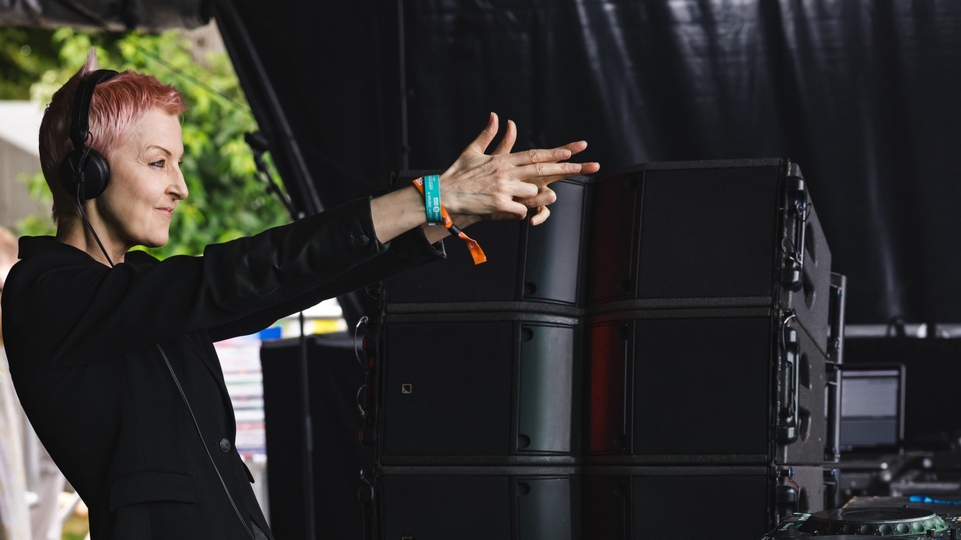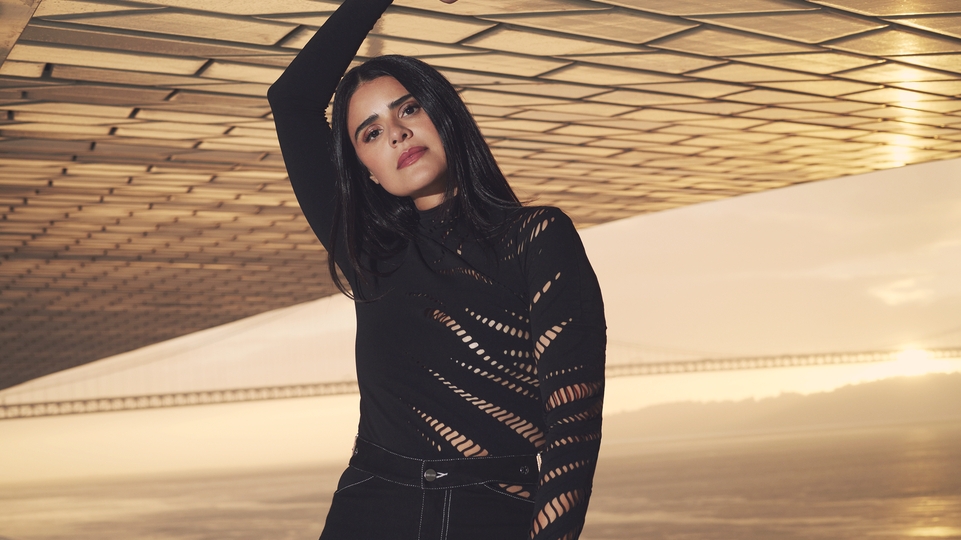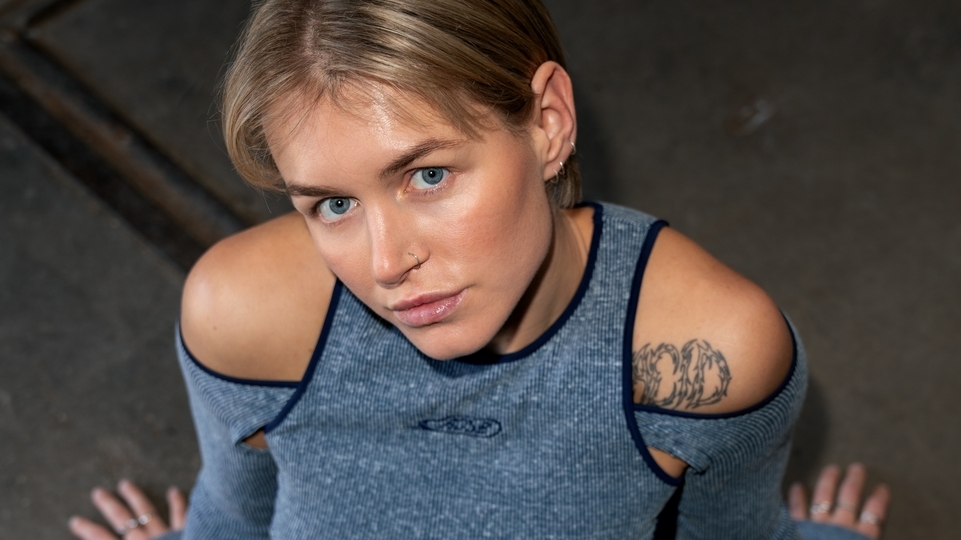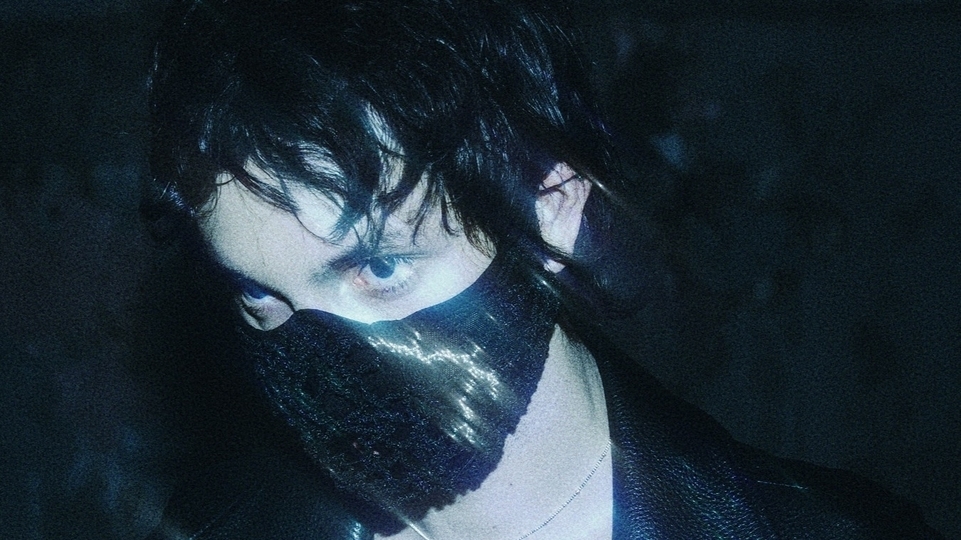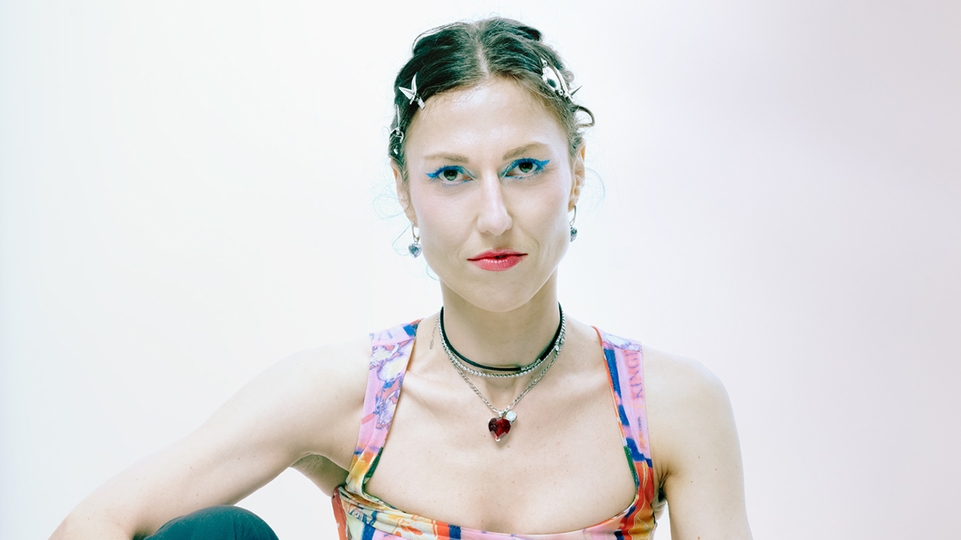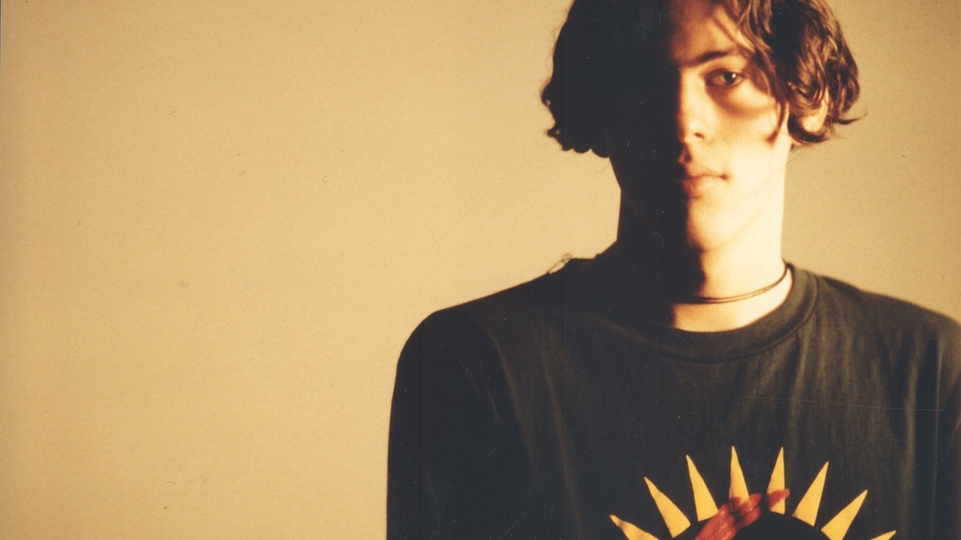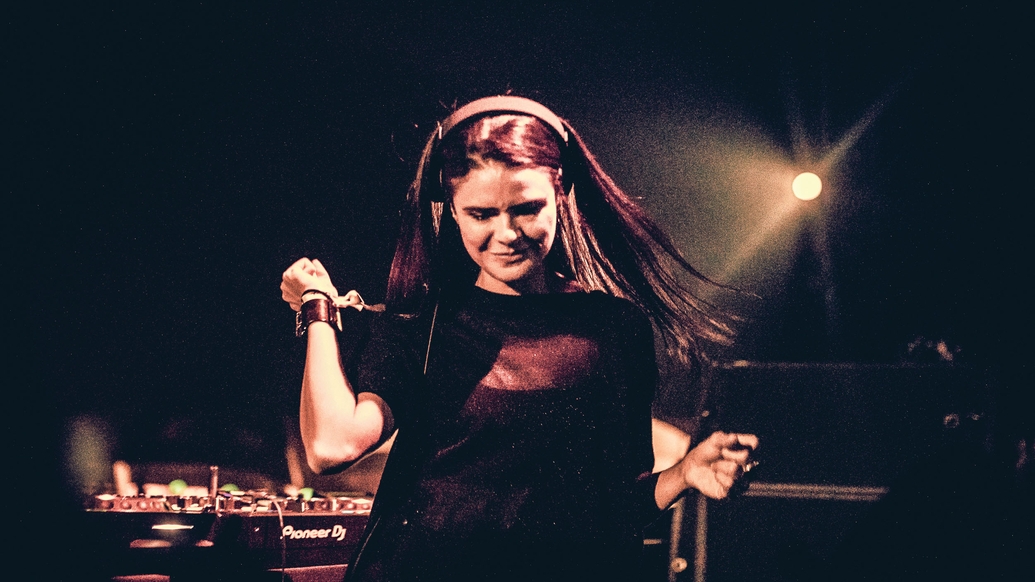
ANNA talks determination, meditation and the power of her incendiary techno
Brazilian DJ and producer ANNA's techno sound marries kinetic grooves with a wealth of emotion. With gigs all over the map and some of the most distinctive underground club hits of recent times, she’s a bona fide techno star, but has had to overcome health problems and career setbacks to get to where she is today. We meet the rising star in her Barcelona base to find out how determination, meditation and a love of techno have fueled her journey so far...
Pics: FERNANDO SIGMA
As someone who’s been DJing since she was 14 years old, it’s rare that Brazilian techno star ANNA is lost for musical inspiration. But DJ Mag has, it seems, caught her on the hop. “I don’t know,” she says, smiling broadly, her teeth the kind of immaculate Hollywood white that would work well in a darkened nightclub. “I don’t know what I would play for the family.” She pauses again. The question of what song would unite her relatives in dancing is clearly one worth consideration. “I think if it was just the electronic part of the family, it would be something from the early days, like EZ Rollers’ ‘Tough At The Top’.”
A vocal drum & bass roller might sound like an unusual choice for this kind of get-together. But ANNA, known to her parents as Ana Miranda, could hardly come from a more fitting background for a rising DJ star. Her father, Ubirajara, is a DJ and former club owner in her home town of Amparo, a municipality of 70,000 people some 75 miles from São Paulo; ANNA’s mother, Regina, used to drive her to gigs when the budding DJ was too young to have a license; her brother Caue is a DJ, and so is her cousin Ricardo. Given this kind of heritage, it was perhaps inevitable that the young Ana would feel the lure of the decks, the flames fanned by drum & bass legend DJ Marky.
“I was impressed,” she says now, the memory still pleasantly fresh some two decades on. “That’s the thing, because first, in my city, electronic music was zero. So my father used to go to São Paulo to buy records, and it was there that he discovered DJ Marky. Marky used to sell records in one of the stores, so that when my dad heard techno, drum & bass, house, he wanted to play this at the club. So of course, my dad invited Marky to play at the club. When I saw him playing, he used to make magic. He still makes magic.”
In some families, 14 might be considered slightly too young to start a DJ career. But for ANNA, who remembers being seated alongside her father in his club’s DJ booth when she was just 10 years old, the experience was part and parcel of growing up in a nightlife dynasty. “I was 14, and then my father told me, ‘Why don’t you try it [DJing]?’ And then this was it.” Even at this tender age, ANNA wasn’t messing around. “He told me what he was impressed about was that I decided to be a DJ, and in one week I had my whole playlist, and I was playing for a crowd of 1,500 people. He said, ‘It’s like you’ve done this all your life. You were not intimidated, not even a bit.’ And my first time playing was at least seven hours straight.” Your first gig was to 1,500 people for seven hours straight? DJ Mag feels nervous just thinking about it. ANNA laughs. It’s a very Brazilian laugh, somehow, thick with happiness. “For me it was like, ‘Oh, it's nice.’ And my father got my best friend to do the lights.”
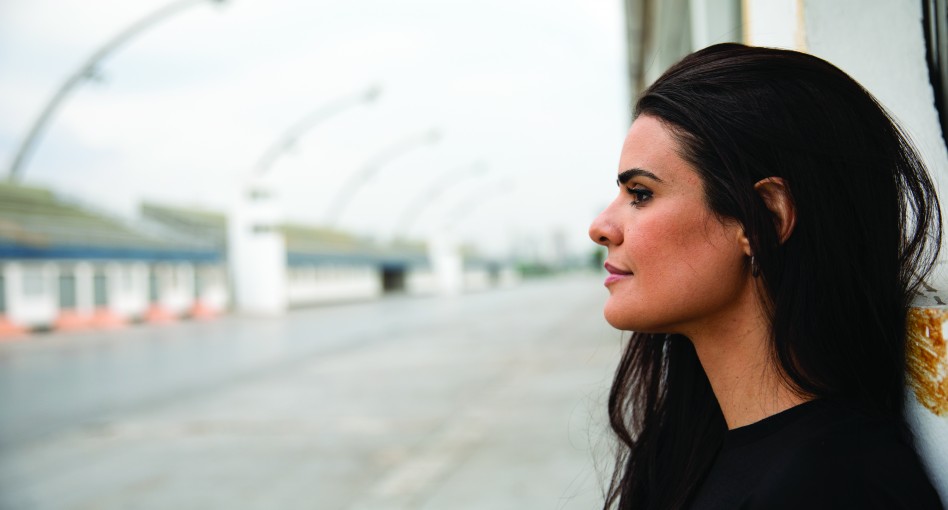
WILLPOWER
When DJ Mag meets ANNA in Barcelona (her home since 2015), two decades have passed since that fateful night when she first stepped behind the decks. And yet, you can still sense the same youthful enthusiasm for the holy trinity of DJ, dancefloor and music when ANNA talks about her career, which has seen her creep right to the edge of DJ superstardom thanks to a globetrotting schedule and the impact of tracks such as 2018 floor-filler ‘Hidden Beauties.’
ANNA’s promotional pictures tend to suggest some kind of dark techno master, dressed in regulation black and ready to crack you over the head with a Drumcode 12-inch if you so much as approach her after a gig. But in reality she is warm, funny and attentive; serious about her work, but not overly earnest in that frustratingly nitpicking way some DJs can be. She seems very happy with her lot, and you can easily believe her when she says that she stays to talk to all of her fans after a gig.
As thousands of techno fans have already discovered, she is also a master at her art, one of those rare DJs — the Carl Coxs, the Derrick Carters — who make playing music in a club feel totally natural, as if they are at home behind the decks and utterly in control of the situation. DJing feels not so much like something ANNA does, but something she is, the art lodged firmly in her bloodstream since childhood. She claims to rarely feel nervous before a gig, and even managed to pull off her first US tour in 2016 despite serious health problems that meant she could barely walk.
“The first time I went [to the U.S.], it was my very first tour and I played some nice festivals but I was sick, super sick,” ANNA says. “I got a thyroid problem, and I was crying at the hotel, ‘Leticia [her manager], I need to come back because I cannot walk.’ And it was very tense, but the gigs were amazing.” How on earth did you manage to DJ? ANNA shrugs. She seems vaguely embarrassed by the question, as if DJing when you can’t walk is no big deal, really. “That’s the thing,” she replies eventually. “I don’t know. I say I’m another person when I am playing. I found the energy. Sometimes I can. I’m so tired, but when I start DJing, I get the energy from the crowd.”
“I feel that I can experiment more and more with the North America crowd. I can play something different from what they are expecting from me, and they are open to listening.”
‘Energy’ is one of those words that comes up a lot when you talk to ANNA. She praises Carl Cox and DJ Marky for their energy; she mentions the energy at the Movement festival where she played in the pouring rain; and she enthuses about the energy she injects into her own musical productions. Most of all, she is concerned about the energy she puts across when she is DJing. “For me this is the most important thing,” she says. “I want there to be 100% good energy, because I’m going to set the energy of the room.”
This luminous vitality is apparent when DJ Mag sees her play in Barcelona in early December. ANNA plays with the bustling vigor of the drum & bass DJs who first inspired her, her hands flickering over the mixer as she works, transitions coming thick and fast. Opening with a weighty one-two punch that sees her rework of Jon Hopkins’ ‘Singularity’ give way to ‘Hidden Beauties’, ANNA has the young crowd captivated, the room infused with a warming glow that snakes through the mechanical grooves.
At times like these, you appreciate ANNA’s two decades of experience behind the decks: she seems to have a kind of innate understanding of what will move a crowd, right down to the knowledge of when exactly they will scream. “[People scream] usually when you have something like an open filter, or these days people scream along with a dry kick,” she says, as if such casual DJ sorcery was open to everyone. “You know from the experience.” Anyone who has heard ANNA DJ or listened to her juddering techno productions will know what a satisfyingly loud experience her music can be, all pounding bass drums, towering synths and a sub bass rush that could knock you clear off your feet. It is corporeal music that you feel in the feet and the belly, which turns your legs all rubbery and disobedient. And yet, for all her deafening sonic grandeur, ANNA agrees with the theory — put forward by a slightly sheepish DJ Mag — that there is a connection between the dancefloors she fills and the meditation that has become such an important part of her life.
“Everybody’s in the same energy — all of us releasing stuff, dancing, releasing the same way as meditation,” she says. “It puts you in an alpha state [a kind of idling default zone that humans experience just before sleep or when meditating]. You can release, you can stop, you can forget... You can stop thinking.”
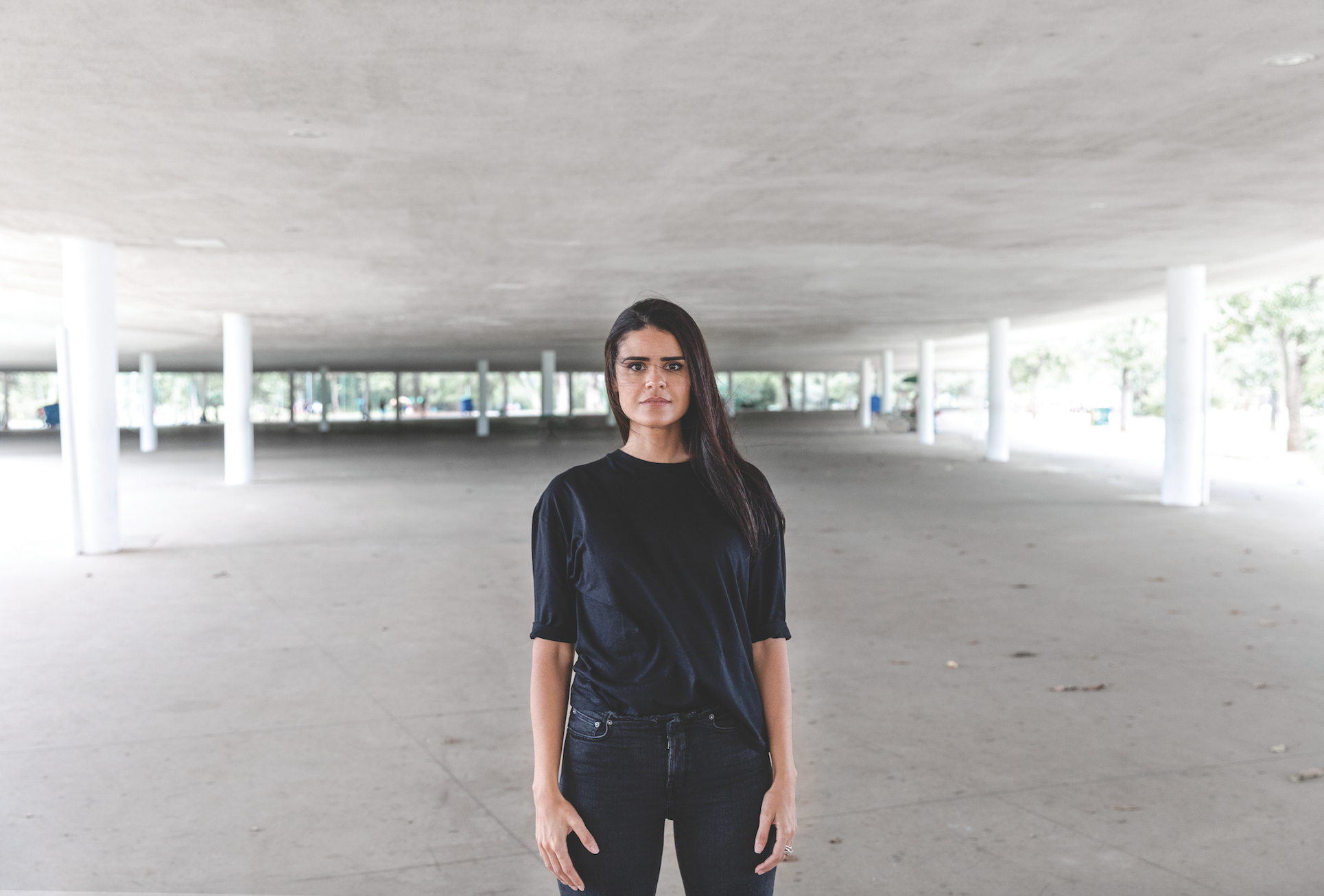
MIND STATE
Meditation is clearly hugely important to ANNA. She started meditating eight years ago, and on the late winter’s day in which DJ Mag meets her, ANNA was out of bed at 5am to meditate before the first rays of sunlight reached the Catalan coast. “The first meditation I like when it’s still dark,” she says. “In the past, I never used to do this, but they taught [me] that it’s very beneficial to meditate at this time of the day. I don’t know why. Maybe because everybody’s sleeping.”
It has also helped ANNA in her music production. “I think it [meditation] changed me as a person, it reflected on my music and on every aspect of my life,” she says. “I’m not so attached to my thoughts anymore. Before, I had this in the back of my head that I wanted to achieve stuff. I was trying to sign [records to labels]. And then I thought, ‘I'm not good enough’. These thoughts, they block you, and with meditation my mind is just quieter. And I’m freer, more creative, because I'm more in touch with my essence.”
Now, ANNA explains, she can go to the studio with a clean mind. “And I can just do the music for the sake of the music, without thinking too much,” she adds. “I couldn't do this before, before the studies I am doing, before the retreats. I couldn’t get rid of these thoughts. I was attached to them.” Thoughts of ambition, you mean? She pauses, briefly, before replying. “Yeah these ambitions, this waiting for results,” she says. “Now, I’m not waiting, I don't have plans. I just go to the studio when I feel creative. If I’m there and I’m forcing it too much, I stop and I come back another hour, as I’m more in the flow now. It was meditation that helped me to see more, to be quieter.”
It is ironic, then, that as ANNA has laid aside her ambition, her career has flowered. Twenty-eighteen was her most successful year to date, starting in January with the monstrous ‘Hidden Beauties’ on Kompakt, its combination of mournful synth lines, acidic trails and trouser-shaking bass riffs finding its way into DJ sets from Cairo to Cleveland. There was also the ‘Razor’ EP on iconic techno label NovaMute, the bewitching ‘Suzi In Transe’ EP for Clash Lion, ‘Speicher 105’ on Kompakt and remixes for Jon Hopkins and SCB (better known as Scuba). The former, a titanic techno take on the title track from Hopkins’ 2018 album ‘Singularity’, has been particularly well received, ANNA dragging the blusterous original kicking and screaming onto the dancefloor with the steely mechanical power of a loved-up production line robot.
It is, of course, pretty easy to be loud with modern musical production tools at your disposal. But ANNA balances this brute force with a melancholy streak that is as long as her productions are tough — think ‘Speicher 101’s ‘The Dansant’ or her 2016 hit ‘Artha’ — as well as a groove she traces back to her Brazilian roots. “What I try to do is to have at least one element with a lot of depth, that transports you,” she says of her productions. “I like just beats, but I also need something that makes you trip a little bit.”
The next big stage for ANNA the producer will be her debut album. It should be out some time in 2019, but after a few false starts, she is not going to be rushed. “I want to do this album with nothing, without deadlines, without anything,” she says, fixing DJ Mag with the long, hard stare of someone who suspects an errant deadline hidden around our person. “I just want to go to the studio and do an album for the sake of the album, and then the business follows.”
You released 11 original tracks in 2018, that’s about album length. What will make your actual album any different? It’s a curveball, but ANNA tackles it without problems. “I want to experiment with new stuff; not to do an album just to have an album, or to have more gigs, or to do an album tour,” she says. The record, she adds, will have, “A maximum of three club tracks, but the rest is going to be a little bit different”. In a nod to her history, she may even record a drum & bass track, although nothing is set in stone. DJ Mag wonders, possibly rather impolitely, given the drift of the conversation, if people actually listen to albums any more. There’s an air of devil’s advocate to the question but also a kernel of truth, with playlists and individual tracks replacing the long-player for many music fans. ANNA is typically unruffled. The album, she explains, is “more a project for the artist”.
“He’s not trying to please or to do business,” she says. “He goes to the studio and does his stuff. He tells his story with the album. He wants to express something.” Indeed, her three favorite techno albums, Plastikman’s chilling ‘Artifakts [bc],’ Laurent Garnier’s mid-period classic ’30’ and Underworld’s surreally beautiful ‘Second Toughest In The Infants’ all reflect this singular spirit of adventure, their collective reach straying way beyond the dancefloor, into the nooks, crannies and canny corners of electronic sound.
DIVERSE SOUND
As well as the planned album, 2019 sees ANNA embark on her biggest North America tour to date, which will include a debut set in Chicago’s iconic Smart Bar, as well as gigs in San Francisco, San Diego, Ottawa, Toronto and Montreal. ANNA explains that North American audiences allow her to be more open with her musical selection. “I feel that I can experiment more and more with the North America crowd,” she says. “I can play something different from what they are expecting from me, and they are open to listen; even if they are there asking for ‘Hidden Beauties’, ‘Artha’, ‘Odd Concept’, I can still show new stuff to them. You can feel when the crowd is not open to listening to something different from what they are expecting — the energy drops, they close themselves to the sound.”
You can tell that ANNA really values this musical open-mindedness. While her own productions have, to date, largely been confined to the four-four field, she talks at length about her love for Bon Iver and Caribou, while her reaction to the criticism she received in 2015 after she remixed ‘Haute Mess’ by Australian DJ duo Nervo is telling. “I think the more barriers you put in music, you’re limiting yourself, your creativity,” she says of the incident. “I think it is pure bullshit. If you feel like doing something, taking a project, it doesn’t matter.”
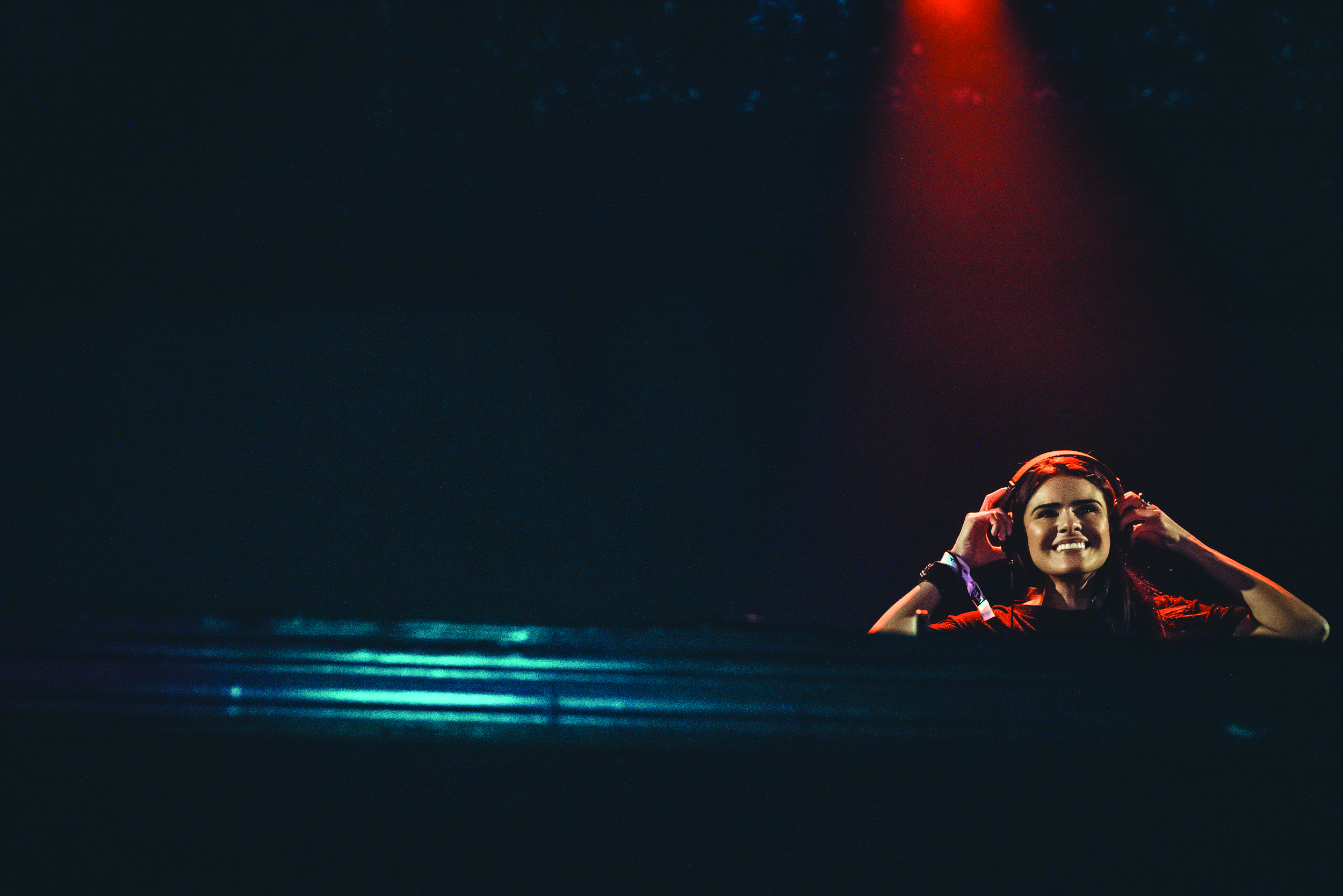
Maybe it is the meditation or the warm winter sun, but ANNA comes across as unflappably serene in the 90 minutes that DJ Mag spends in her company. She is friendly but shy, praising idols such as Jeff Mills and Richie Hawtin rather than expanding upon what she does so well, her self-effacing nature a welcome respite from the ego-driven world of dance music. But it would be wrong to think that ANNA has had it easy. “I say that we [my family] had a club and everything. It gives the impression that we had money and everything, but no, it was not like that,” ANNA says. “I used to go to São Paulo to buy records, and I had money to buy three. That was it. I used to travel for six hours to buy three vinyl.”
Rather ironically, given ANNA’s success on the global techno scene, at one point her father’s obsession with electronic music actually threatened to empty the family coffers. ANNA paints a charmingly stubborn picture of her father. “My father wanted to play this underground dance music at a club, and people didn't like it,” she says. “You know, people were like ‘dah [exasperated noise]’ and he was always, ‘No, I want this’.”
“There was a time that the club was not doing well at all,” she continues, “and he insisted he just wanted to play this kind of music. It doesn’t matter. There was no one at the club, and we said, ‘No, you need to play something more... commercial because we need to make money. Right?’ And he used to say, ‘No, I want this kind of music’.” ANNA herself faced difficulties in her DJ career after moving to the Czech Republic with her DJ/producer boyfriend Wehbba in 2009. She enjoyed the experience, she says, traveling to Vienna and playing small gigs locally. But financially it was a bust. When ANNA moved back to Brazil in 2010, she even thought about getting another job. “I never worked with anything else in my life, I was just a DJ,” she says. “But when I came back from the Czech Republic, for the first time, now I’m going to have to find another job to pay my bills because I don’t know what’s going to happen.”
As it turned out, familiar fate intervened. “When I moved back to Brazil, my cousin Monique started working in a DJ agency, and invited me to be part of the roster, and I started to have around four gigs a month in Brazil. I could pay the bills with my music once again,” ANNA says. “Since then, things started slowly happening, some international and big artists started to play my music, and I met my manager Leticia, who was at first my agent at IMD Agency in London.”
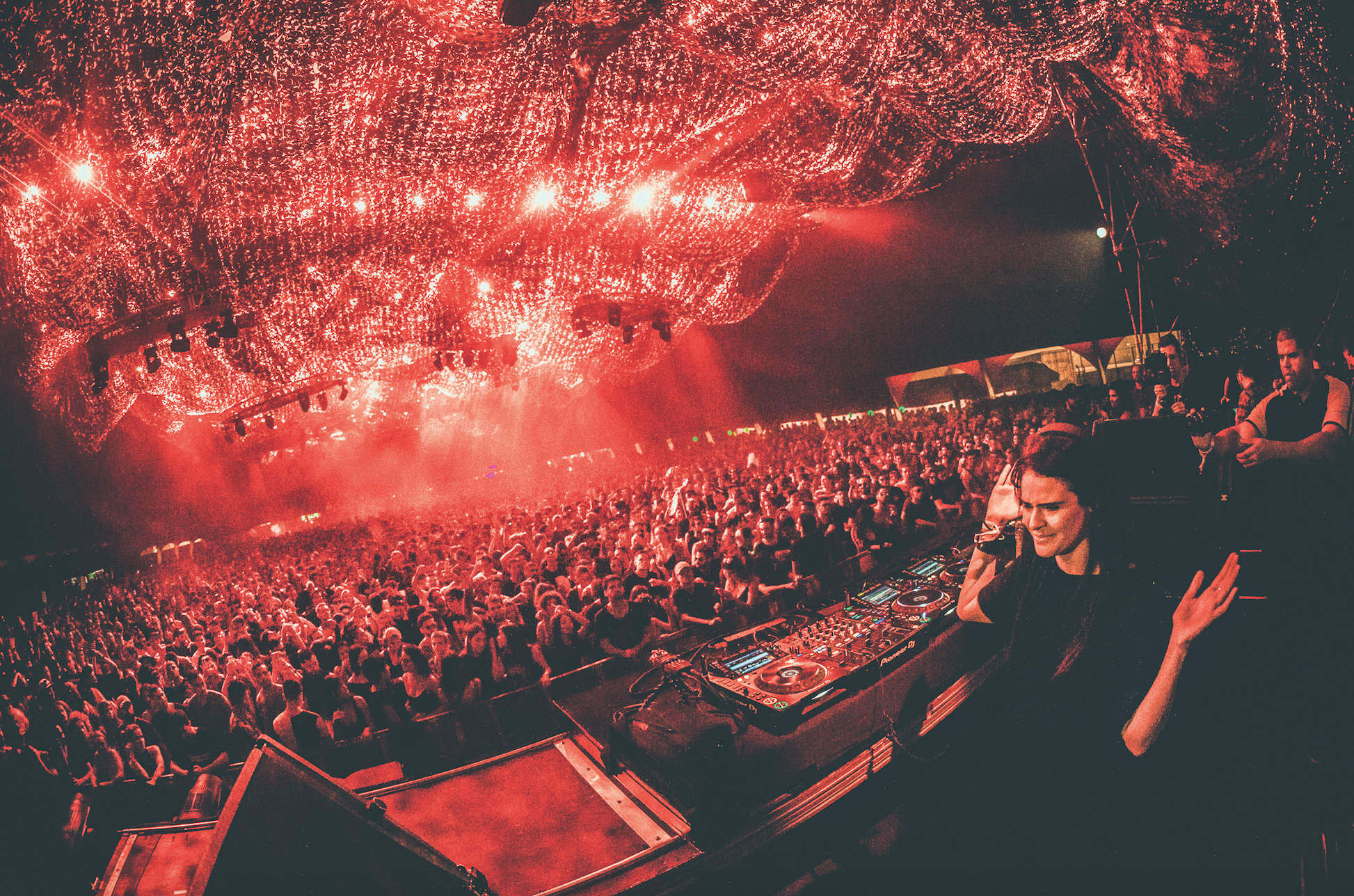
Even then, things didn’t go entirely smoothly. “In Brazil, I was playing, but I had like maximum four gigs per month, receiving small fees. It wasn’t that I was not happy. I was satisfied, but I used to go to the agency, you know, ‘Hey, what do you think?’” At the time, ANNA had already made a name for herself in the techno world: Green Velvet had remixed her 2013 track ‘Unique’ (released as DJ Anna) and in the same year, she remixed Pleasurekraft & Format: B’s ‘Sexus’. But Brazil was in the middle of a deep house phase that had little in common with ANNA’s tender techno force.
“I used to go to the agents and tell the guy, ‘Hey, what do you think we should do to get more gigs?’ He’d say, ‘You have to change your sound.’ And the guy looked at me. I had an insight. ‘You’re never going to make it with your sound. My techno, whatever. You’re never going to make it.’ But that didn’t affect me. I thought, ‘OK, he thought I was not getting any response in Brazil’. And then I left to go to Europe in 2015, and things started happening more and more.”
“Things started happening” is one way of looking at it; so many “things,” in fact, that Ana Miranda greets 2019 as one of the fastest rising stars in a globe-trotting techno scene that stretches from Nina Kraviz’s Siberian electronics to STAB Virus in South Africa. It’s been a glorious rise for ANNA, from 14-year-old DJ prodigy in Amparo to international DJ queen. But even techno stars, it seems, need to keep their parents happy. “Can you mention my mom, please?” ANNA asks, as DJ Mag starts to pack up and leave. “She gets jealous. I always talk about my dad and the club, but my mom was really important too.”
Regina Celia Flores: the world of techno salutes you and your wonderful record-spinning daughter!

